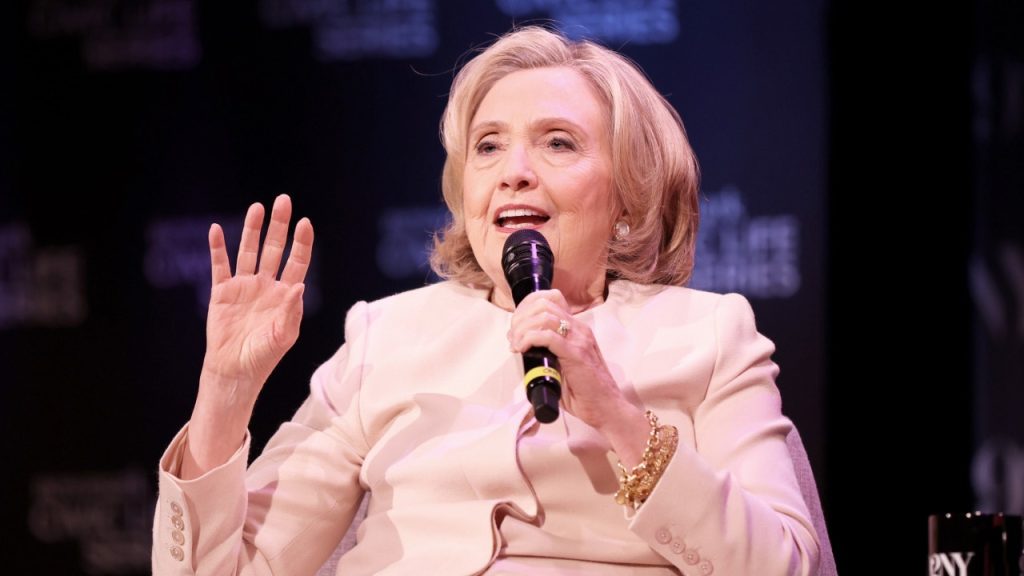Former Secretary of State Hillary Clinton has made headlines once again following her recent comments regarding female Republicans. During a discussion at New York City’s 92nd Street Y, she suggested that many women in the Republican Party serve as “handmaidens to the patriarchy.” Clinton’s remarks have drawn attention amidst the backdrop of the political landscape, where women candidates from both parties have been vying for leadership positions, including the upcoming presidential election. The implications of her comments reflect ongoing debates surrounding gender, politics, and representation.
| Article Subheadings |
|---|
| 1) Clinton’s Comments on Republican Women |
| 2) Notable Women Candidates in Politics |
| 3) Historical Context of Female Leadership |
| 4) The Impact of Gender on Political Perception |
| 5) Future of Female Leadership in America |
Clinton’s Comments on Republican Women
During a conversation on May 1, Hillary Clinton addressed the potential for women leadership in the political arena, specifically in relation to her Republican counterparts. When asked by moderator Margaret Hoover for advice for the first female President of the United States, Clinton responded with a striking assertion: “Well, first of all, don’t be a handmaiden to the patriarchy, which kind of eliminates every woman on the other side of the aisle, except for very few.” This comment sought to underscore Clintons’ stance on the influence of patriarchal structures in politics, suggesting that many female leaders within the Republican Party fail to challenge these norms effectively.
Notable Women Candidates in Politics
Throughout the past few election cycles, numerous women have stepped forward to challenge the male-dominated political landscape. Among them, Nikki Haley, the former U.N. Ambassador under President Donald Trump, has recently been a prominent figure. More traditional Republican figures, such as Lisa Murkowski, have also been in the spotlight. During the discussion, Clinton pointed to Murkowski as one of the few Republican women she respects, emphasizing her history of dissent against Trump. Additionally, former Republican Representative Liz Cheney has made waves for her strong stance against the former president and her notable role in leading investigations into the January 6 Capitol riots. Clintons’ comments highlight a critical view of how these women navigate their roles in a predominantly conservative political framework.
Historical Context of Female Leadership
Clinton’s remarks come during a significant moment in U.S. history where discussions surrounding female leadership are increasingly relevant. While Clinton herself narrowly lost the presidential race in 2016, the subsequent years have seen others, like Vice President Kamala Harris, emerge in prominent roles. Clinton emphasized that despite the challenges, it will take time for women to break through the glass ceiling. As she stated, “Look, first we have to get there, and it is, you know, obviously so much harder than it should be.” This sentiment reflects a historical struggle women have faced in politics, where systemic barriers have historically impeded access to leadership roles.
The Impact of Gender on Political Perception
The interplay between gender and political narrative is a crucial aspect of Clinton’s critique. By suggesting that women who align with conservative values are failing to support progress for women, Clinton raises questions about allegiance and representation. Her previous descriptions of Trump supporters as being a “basket of deplorables” demonstrate a pattern of labeling that can polarize political dialogue. Furthermore, her comments about the voting behavior of white women in the 2016 election suggest an ongoing struggle for unity among women in political spheres. The dynamic built around gender perception impacts how candidates, regardless of their affiliation, are viewed by the public.
Future of Female Leadership in America
As the political landscape continues to evolve, the future of female leadership remains precarious yet hopeful. Clinton’s acknowledgment of individuals like Harris and Murkowski opens the door to discussions about party affiliation’s impact on perceptions of leadership. Future presidential elections will be a test of whether women can overcome historical biases and challenges to achieve the highest office in the land. Clinton’s desire to support candidates who empower women rather than yield to patriarchal pressures highlights the need for authentic representation in leadership roles across political lines.
| No. | Key Points |
|---|---|
| 1 | Hillary Clinton criticized female Republican leaders for aligning with patriarchal structures. |
| 2 | Notable Republican women like Nikki Haley and Lisa Murkowski are navigating complex roles within their party. |
| 3 | Clinton highlighted historical challenges faced by women in politics and leadership roles. |
| 4 | The perception of gender plays a crucial role in political narratives and candidate reception. |
| 5 | The future of female leadership in America is hopeful but still faces significant barriers. |
Summary
The comments made by Hillary Clinton during her recent interview shed light on the challenges and complexities of being a woman in politics. By critiquing Republican women who do not challenge patriarchal structures, Clinton emphasizes the significance of genuine representation and leadership. As the political landscape evolves, the ongoing discourse surrounding female candidates will undoubtedly shape the future of American politics and gender equality in leadership.
Frequently Asked Questions
Question: What did Hillary Clinton mean by “handmaiden to the patriarchy”?
Clinton used this phrase to suggest that certain female Republican leaders fail to challenge the traditional male-dominated structures in politics.
Question: Who are some notable women candidates in recent political history?
Notable women include Nikki Haley, Lisa Murkowski, and Liz Cheney, among others, who have played significant roles in recent elections.
Question: What barriers do women still face in achieving leadership positions in politics?
Women often confront systemic challenges, including biases and perceptions regarding their capabilities, which can hinder their paths to leadership roles.
